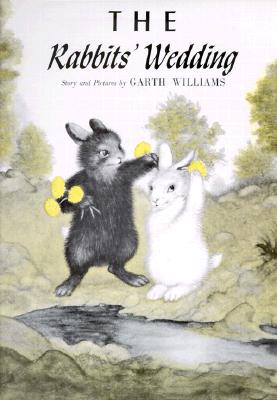Yes, yeah we’re movin’ on
Looking for direction
Mmm mm we’ve covered much ground
Thinking back to innocence
I can no longer connect
I don’ t have a heart left to throw around
Oh, and time moves on like a train
That disappears into the night sky
Yeah, I still get a sad feeling inside to see the red tail lights wave goodbye
We’ll grow old together
We’ll grow old together
And this love will never
This old love will never die
This a partial set of lyrics from ‘This Old Love‘ by Lior.
I loved a book when I was younger – The Rabbits Wedding. The story – like the song is beautiful – the little white rabbit makes the little black rabbit happy.
This evening I was reading up on the author – Garth Williams and I discovered that this book which sits in my top three favourite picture books of all time, is quite controversial.
Garth Williams wrote and illustrated a controversial story called The Rabbit’s Wedding. The book was banned over its perceived theme of interracial love. The story was about a black rabbit marrying a white rabbit. Some have noted the obvious logic of illustrating the rabbits with two different colors so the reader might tell them apart more readily. Others, in their quest to depoliticize the book, have have claimed a perception of the black and white motif as, perhaps, a reference to yin and yang (i.e. male and female, though, inconsistently, the color-to-gender associations in the book are reversed.)
Jonathon Green, in The Encyclopedia of Censorship (Facts on File, 1990) [[1]], wrote:
The Rabbit’s Wedding, by Garth Williams, was transferred from the open shelves to the reserved shelves at the Montgomery (Alabama) Public Library in 1959 because an illustration shows a black buck rabbit with a white doe rabbit. Such miscegenation, stated an editor in Orlando, was “brainwashing . . . as soon as you pick up the book and open its pages you realize these rabbits are integrated.” The Montgomery Home News added that the book was integrationist propaganda obviously aimed at children in their formative years.
I have expressed my sadness over themes in children’s books being chastised before.
 When or if I ever have children, I want them to read as widely as possible. The good, the ugly. There is a definite point at which you have to take into account the maturity of the reader, but what better than to be exposed to all angles – with some guided direction you’re going to achieve a much better standing on issues presented.
When or if I ever have children, I want them to read as widely as possible. The good, the ugly. There is a definite point at which you have to take into account the maturity of the reader, but what better than to be exposed to all angles – with some guided direction you’re going to achieve a much better standing on issues presented.
I know that there were things that I read far too early. These – like it or not, I know contributed to the rounding of my education – not just the ‘school stuff’, but I think relationally as well.
I cannot remember historical events, dates etc through even having learnt them by theoretical means but I remember quite clearly books I read on the middle ages, biblical times, Greece and Rome, Colonialism, Australian history, scientific and theological biographies…
I read and I read and I read.
There is something altogether compelling about narrative.
We should be less concerned about political correctness and more concerned about a thorough understanding of the world.
Surely some of the ‘mistakes’ we make as a contemporary society could be better learned from the safety of imagination than experience.
I know this is all clearly disputable and I am not in one hundred percent agreeance on this from every angle, but the point still stands.
Stories help us feel less alone, less alien in our misgivings, our hopes, our fears, our growing up.
It sometimes seems that’s where it stops. We grow up. We stop leaving so much to our imagination and go chasing reality.
I don’t know about letting kids read without much of a filter…
but I completely agree about stories.
Stories were my peephole to the world growing up.
My kids are going to learn to love to read. 🙂